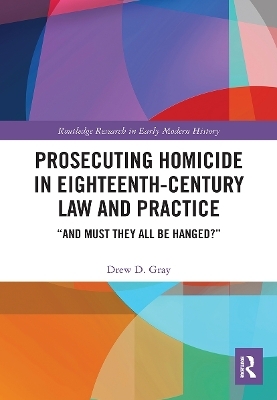
Prosecuting Homicide in Eighteenth-Century Law and Practice
“And Must They All Be Hanged?”
Seiten
2022
Routledge (Verlag)
978-1-032-40063-1 (ISBN)
Routledge (Verlag)
978-1-032-40063-1 (ISBN)
This book analyzes homicide prosecution in the 18th century. Using case studies, it explores the ways law intersected with concerns about the relationships between government and the governed, and argues that previous studies have underplayed the importance of context in determining who hanged.
This volume uses four case studies, all with strong London connections, to analyze homicide law and the pardoning process in eighteenth-century England. Each reveals evidence of how attempts were made to negotiate a path through the justice system to avoid conviction, and so avoid a sentence of hanging. This approach allows a deep examination of the workings of the justice system using social and cultural history methodologies. The cases explore wider areas of social and cultural history in the period, such as the role of policing agents, attitudes towards sexuality and prostitution, press reporting, and popular conceptions of "honorable" behavior. They also allow an engagement with what has been identified as the gradual erosion of individual agency within the law, and the concomitant rise of the state. Investigating the nature of the pardoning process shows how important it was to have "friends in high places," and also uncovers ways in which the legal system was susceptible to accusations of corruption. Readers will find an illuminating view of eighteenth-century London through a legal lens.
This volume uses four case studies, all with strong London connections, to analyze homicide law and the pardoning process in eighteenth-century England. Each reveals evidence of how attempts were made to negotiate a path through the justice system to avoid conviction, and so avoid a sentence of hanging. This approach allows a deep examination of the workings of the justice system using social and cultural history methodologies. The cases explore wider areas of social and cultural history in the period, such as the role of policing agents, attitudes towards sexuality and prostitution, press reporting, and popular conceptions of "honorable" behavior. They also allow an engagement with what has been identified as the gradual erosion of individual agency within the law, and the concomitant rise of the state. Investigating the nature of the pardoning process shows how important it was to have "friends in high places," and also uncovers ways in which the legal system was susceptible to accusations of corruption. Readers will find an illuminating view of eighteenth-century London through a legal lens.
Drew D. Gray is the head of Humanities at the University of Northampton.
1. Introduction and Themes 2. "Mercy Without Justice"? Press Criticism of the Pardoning Process in Late Eighteenth-Century London: The Kennedy Case of 1770 3. "There Goes Clarke, That Blood-Selling Rascal": Murder, Revenge and the Crowd in Early 1770s Spitalfields 4. The Royal Duchess and the Apothecary’s Son: Homicide, Communal Prejudice and Pleading for Pardon in Provincial England 5. Sex, Scandal and Strangulation: The Strange Case of Francis Kotzwara and Susannah Hill 6. Conclusions
| Erscheinungsdatum | 17.08.2022 |
|---|---|
| Reihe/Serie | Routledge Research in Early Modern History |
| Zusatzinfo | 7 Illustrations, black and white |
| Verlagsort | London |
| Sprache | englisch |
| Maße | 152 x 229 mm |
| Gewicht | 453 g |
| Themenwelt | Geschichte ► Allgemeine Geschichte ► Neuzeit (bis 1918) |
| Geschichte ► Teilgebiete der Geschichte ► Kulturgeschichte | |
| Recht / Steuern ► Strafrecht ► Kriminologie | |
| ISBN-10 | 1-032-40063-3 / 1032400633 |
| ISBN-13 | 978-1-032-40063-1 / 9781032400631 |
| Zustand | Neuware |
| Haben Sie eine Frage zum Produkt? |
Mehr entdecken
aus dem Bereich
aus dem Bereich
Europa 1848/49 und der Kampf für eine neue Welt
Buch | Hardcover (2023)
DVA (Verlag)
CHF 67,20
Giordano Bruno - ein ketzerisches Leben
Buch | Hardcover (2024)
C.H.Beck (Verlag)
CHF 41,85


